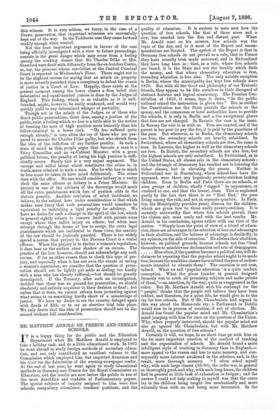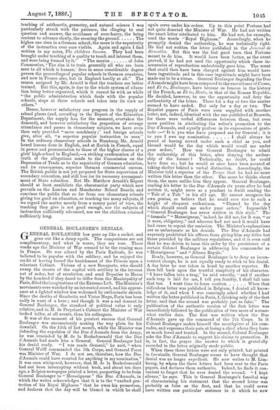MR. MATTHEW ARNOLD ON FRENCH AND GERMAN SCHOOLS.
IT is a happy thing for the public and the Education Department when Mr. Matthew Arnold is employed to take a holiday task, and do a little educational work. In 1865 he went abroad to study foreign methods of secondary educa- tion, and not only contributed an excellent volume to the Commission which employed him, but imported Arminius and his Geist for the delectation of the evening-newspaper reader. At the end of last year, he went again to study educational methods in Germany and France for the Royal Commission on Education, and the results are now before the public in one of the most Arnoldian and readable of Parliamentary papers. The special subjects of inquiry assigned to him were free schools, compulsory attendance, teachers' positions, and the quality of education. It is curious to note now how the question of free schools, like that of three acres and a cow, has receded into the dim and distant past. When Mr. Arnold went on his mission, free schools was the topic of the day, and to it most of the Report and recom- mendations are devoted. The upshot of the Report is that in Germany free schools do not prevail as a rule, that in France they have recently been made universal, and in Switzerland they have long been so ; that, as a rule, where free schools
are found, it is the State and not the locality which finds the money, and that where elementary education is free,
secondary education is free also. The only notable exception is Berlin, where the municipality has kept free schools since 1870. But with all the Geist and philosophy of our Teutonic friends, they appear to be like ourselves in their disregard of
abstract doctrine and logical consistency. The Prussian Con- stitution of 1850, it seems, lays it down, "In the public national school the instruction is given free." But as neither the Constitution nor the State provide the schools or the money, and the communes or local authorities have to provide the schools, it is only in Berlin and a few exceptional places that fees are not charged. In Bavaria the case is the same. In Saxony the rule is as with us. Fees are exacted, and if the parent is too poor to pay the fee, it is paid by the guardians of the poor. But wherever, as in Berlin, the elementary schools are free, the secondary schools are heavily subsidised. In Switzerland, where all elementary schools are free, the same is true. In Lucerne, the higher as well as the elementary schools are free. In Zurich, the secondary schools are also free, but the highest schools are only subsidised. In Switzerland, as in the United States, all classes mix in the elementary schools ; and the triumph of democracy has resulted not in lowering the richer classes, but in elevating the poorer. Neither in Switzerland nor in Nuremburg, where school-fees have dis- appeared, were there any hopelessly poverty-stricken looking children. Even in Berlin and Paris there are no schools, or even groups of children, wholly " ragged " in appearance, or confined to one, and that the lowest, class. This is explained partly by the fact that there is no "East End," the poor living among the rich, and not in separate quarters. In Paris, too, the Municipality provides penny dinners for the children, which are given free to those really poverty-stricken. It is certainly noteworthy that where free schools prevail, there the classes mix most easily and with the best results. Mr.
Arnold, in his conclusions, agrees rather with our view of the matter. "Simply from the point of view of a friend of educa- tion, there are advantages in the retention of fees and advantages in their abolition, and the balance of advantage is decidedly, in my opinion, on the side of retention." He advises their abolition, however, on political grounds, because schools not free "lend themselves to mischievous declamation and arts of demagogues.
How often, if the question becomes a political one, will de- claimers be repeating that the popular school ought to be made free, because the wealthier classes have robbed the poor of endow- ments intended to educate them ? The assertion is not true,
indeed. What we call 'popular education' is a quite modern conception. What the pious founder in general designed
formerly was to catch all promising subjects and make priests of them,"—an assertion, by the way, quite as exaggerated as the other. But Mr. Matthew Arnold, with his contempt for the "people," thinks that the people will believe they have been
robbed, and therefore, for a quiet life, he would give in to the cry for free schools. But if Mr. Chamberlain had argued in this way about the Home-rule cry, a Parliament in Dublin would now be in process of creation, if not of election. Mr. Arnold has found the popular mind and Mr. Chamberlain's mind jumping with him for once on the question of the Union. Why, when properly instructed, should the popular mind not also go against Mr. Chamberlain, but with Mr. Matthew Arnold, on the question of free schools ?
Certainly it will, we hope, in no short time go with him on the far more important question of the method of teaching and the organisation of schools. Mr. Arnold found a more intelligent style of teaching in Germany than in England,— more appeal to the reason and less to mere memory, and con- sequently more interest awakened in the scholars, and, in the result, more thorough memory. "I often asked myself why, with such large classes (50-80), the order was in general so thoroughly good, and why, with such long hours, the children had in general so little look of exhaustion or fatigue ; and the answer I could not help making to myself was that the cause lay in the children being taught less mechanically and more naturally than with us, and being more interested. In the teaching of arithmetic, geometry, and natural science I was particularly struck with the patience, the clinging to oral question and answer, the avoidance of over-hurry, the being
content to advance slowly, the securing the ground The higher one rises in a German school, the more is the superiority of the instruction over ours visible. Again and again I find written in my notes, The children human. They had been brought under teaching of a quality to touch and interest them, and were being formed by it." "The maxim of John Commenius, 'The aim is to train generally all who are born men to all which is human,' does in some considerable degree govern the proceedings of popular schools in German countries, and now in France also, but in England hardly at all." The reason assigned by Mr. Arnold is that the teachers are better trained. But this, again, is due to the whole system of educa- tion being better organised, which it cannot be with us while "the public administration which deals with the popular schools, stops at those schools and takes into its view no others."
Hence, however satisfactory our progress in the supply of school places (and, according to the Report of the Education Department, the supply has, for the moment, overtaken the demand), and however satisfactory the proportion of average attendance and passes in elementary subjects, we have even then only provided "mere machinery ;" and foreign schools give, after all, "a superior popular instruction to ours." In the ordinary elementary schools in Hamburg, Mr. Arnold heard lessons done in English, and at Zurich in French, equal in power and pronunciation to those of the higher classes of a girls' high-school in England,—a striking confirmation of the truth of the allegations made to the Commission on the Depression of Trade as to the superiority of German education, and its consequence, superior German commercial success. The British public is not yet prepared for State supervision of secondary education, and still less for its necessary accompani- ment of State subsidies. But Mr. Matthew Arnold's Report should at least annihilate the obscurantist party which now prevails on the London and Manchester School Boards, and convince the public that so far from our elementary schools giving too good an education, or teaching too many subjects, if we regard the matter merely from a money point of view, the teaching they give is not good enough, nor the subjects of instruction sufficiently advanced, nor are the children retained sufficiently long.



































 Previous page
Previous page